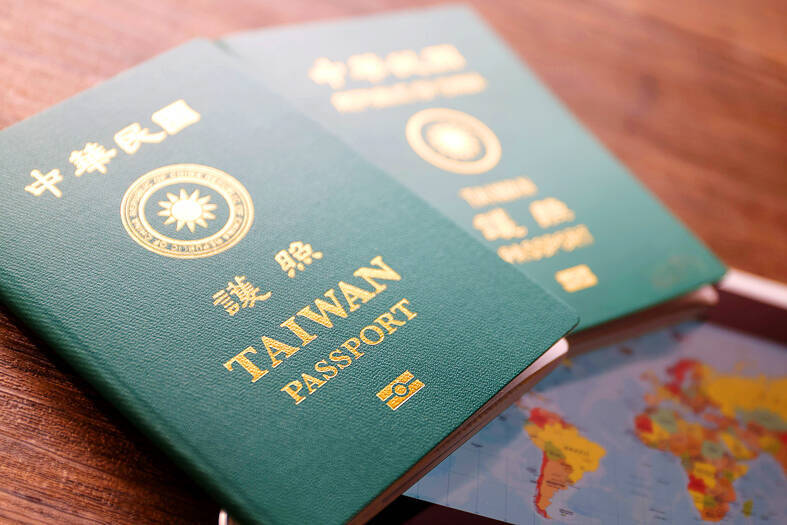Judicial authorities are investigating the alleged sale of Republic of China passports to China-based gangs.
The Taoyuan District Prosecutors’ Office last week indicted 13 people, including alleged operation heads Huang Shih-hsien (黃世賢) and Chiu Cheng-wen (邱政文), for alleged passport fraud.
In 2018, border control officials at international airports in Rome and Madrid alerted Taipei that they had stopped Chinese nationals who were using altered Taiwanese passports to enter the nations.

Photo: CNA
Taoyuan prosecutors coordinated with police and the National Immigration Agency’s (NIA) Border Affairs Corps in an investigation, leading the indictment of Huang, 48, and Chiu, 46, and the seizure of Taiwanese passports and other travel documents — including Chinese-issued “Taiwan Compatriot Permits” — for about a dozen people.
Eleven others were indicted for allegedly selling passports, contravening the Passport Act (護照條例), as well as breaches of the Criminal Code for allegedly causing a public official to make false records in public documents, and use of forged or altered documents.
Huang and Chiu made a lot of money through alleged illegal sales of Taiwanese passports to Chinese groups by seeking out impoverished people and paying them to apply for travel documents, the indictment said.
The case has damaged the credibility and international trust of the Taiwan passport, and compromised border controls and national security, it said.
From 2015 to 2019, Huang and Chiu would visit Taipei Railway Station and public parks, including Wanhua District’s (萬華) Bangka Park (艋舺公園), seeking out impoverished or homeless people, prosecutors said.
The pair would pay people up to NT$25,000 to apply for a passport, with help from travel agency staff who also assisted with applying for documents to travel to China, prosecutors said.
The people they recruited were also given cash to buy clothes and given tickets to fly to China, prosecutors said.
While in China, the recruits were taken to apply for bank accounts, they said, adding that they handed over their passports upon their return to Taiwan.
Huang and Chiu then sold the travel documents to Chinese groups for up to NT$300,000, prosecutors said, adding that the passports could be resold for up to US$50,000.
NIA officials said that the illegal passport trade is lucrative in China and there is high demand for Taiwanese passports, due to the nation’s reciprocal visa-free agreements with more than 100 countries.
Taiwanese passports are highly sought after by Chinese officials and businesspeople who are facing charges for economic crimes, or others facing prosecution and seeking to escape abroad, as well as wealthy families to move their assets outside China or seeking entry into the US, Canada or European countries, the NIA officials said.
Moreover, Chinese intelligence officials carry Taiwanese passports as cover, authorities said.
Additional reporting by Huang Ching-hsuan

Chinese spouse and influencer Guan Guan’s (關關) residency permit has been revoked for repeatedly posting pro-China videos that threaten national security, the National Immigration Agency confirmed today. Guan Guan has said many controversial statements in her videos posted to Douyin (抖音), including “the red flag will soon be painted all over Taiwan” and “Taiwan is an inseparable part of China,” and expressing hope for expedited reunification. The agency last year received multiple reports alleging that Guan Guan had advocated for armed reunification. After verifying the reports, the agency last month issued a notice requiring her to appear and explain her actions. Guan

The Kaohsiung Tourism Bureau audited six hotels in an effort to prevent price gouging ahead of Korean band BTS’ concert tour in the city scheduled for Nov. 19, 21 and 22 this year. The bureau on Friday said that the audits — conducted in response to allegations of unfair pricing posted on social media — found no wrongdoing. These establishments included the local branches of Chateau de Chine, Hotel Nikko, My Humble House, and Grand Hai Lai, it said, adding that the Consumer Protection Commission would have penalized price gougers had the accusations been substantiated. The bureau said the Tourism Development Act

BACK TO WINTER: A strong continental cold air mass would move south on Tuesday next week, bringing colder temperatures to northern and central Taiwan A tropical depression east of the Philippines could soon be upgraded to be the first tropical storm of this year, the Central Weather Administration (CWA) said yesterday, adding that the next cold air mass is forecast to arrive on Monday next week. CWA forecaster Cheng Jie-ren (鄭傑仁) said the first tropical depression of this year is over waters east of the Philippines, about 1,867km southeast of Oluanpi (鵝鑾鼻), and could strengthen into Tropical Storm Nokaen by early today. The system is moving slowly from northwest to north, and is expected to remain east of the Philippines with little chance of affecting Taiwan,

GIVE AND TAKE: Blood demand continues to rise each year, while fewer young donors are available due to the nation’s falling birthrate, a doctor said Blood donors can redeem points earned from donations to obtain limited edition Formosan black bear travel mugs, the Kaohsiung Blood Center said yesterday, as it announced a goal of stocking 20,000 units of blood prior to the Lunar New Year. The last month of the lunar year is National Blood Donation Month, when local centers seek to stockpile blood for use during the Lunar New Year holiday. The blood demand in southern Taiwan — including Tainan and Kaohsiung, as well as Chiayi, Pingtung, Penghu and Taitung counties — is about 2,000 units per day, the center said. The donation campaign aims to boost